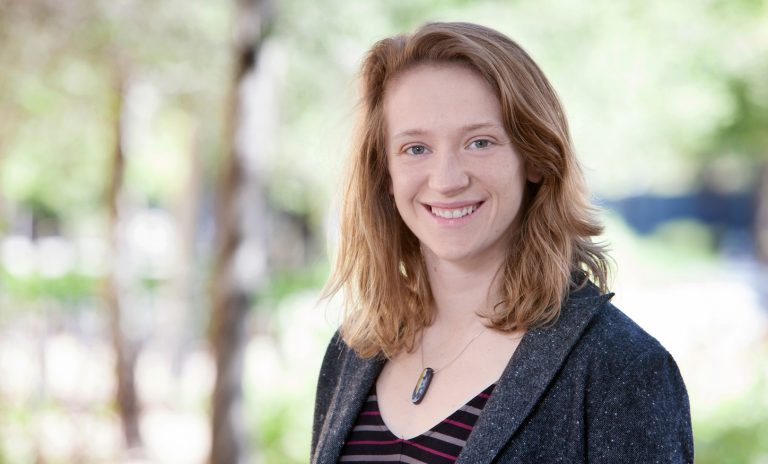

Dr. Kristin Laurin joins the Department of Psychology on July 1, 2016.
Join us in welcoming Dr. Kristin Laurin as Assistant Professor in the Department of Psychology. Dr. Laurin comes to UBC from the Stanford Graduate School of Business, where she was Assistant Professor of Organizational Behaviour since 2012. She earned her PhD in Social Psychology from the University of Waterloo.
Laurin’s research involves some of the topics we’re not supposed to discuss at dinner parties: politics and religion. Drawing from her own life, she’s interested in how people’s goals and motivations can shape their beliefs and ideologies, and vice versa.
In this Q&A, she shares the questions she tries to answer in her research, her motto, and what she does when she’s not in the lab or classroom.
First of all, can you tell us a little about yourself?
Born in Toronto, raised in Montreal, I grew up playing hockey and thinking that only a completely insane person would do a PhD. Then I went to university and became an Ultimate Frisbee player who never wanted to leave academia. Now I hold a more balanced perspective: I play both sports casually, and I still hope to be a lifelong academic, while at the same time recognizing that makes me at least some kind of insane.
What kinds of questions do you try to answer through your research?
I have a really wide range of interests and I get excited about questions that span almost all of social psychology. Two that are at the top of my mind right now are: (1) how and why does social class reproduce across time and across generations, such that it’s really hard for people born into lower class families to climb the social ladder? and (2) how do we come to adopt the goals that we spend so much of our time pursuing, and how does that connect with our relationship partners—how does their presence influence the goals we choose, and how does our choice of goals affect the relationship?
Can you give us an example of this in our daily lives?
The second of these is easier–we’ve all been on both ends of a situation where two people get together and one of them picks up one of the other’s aspirations or favourite hobbies. Maybe one partner decides to adopt a new fitness regimen, and the other decides to become a health nut too, or maybe you meet someone who plays Frisbee and you decide that’s something you want to do as well. For me what’s interesting about that is when does it happen, and when do partners instead try to maintain their independent goals? And also how does it affect the relationship: is it fun to have a built-in workout buddy, or is it kind of annoying that your partner picked up what was once YOUR sport?
How did you become interested in this line of research?
I tend to draw from my daily life in terms of the research questions that interest me. Sometimes that means examining my actual own life experience, for instance with relationships, and other times that means thinking about what I’m seeing on the news or even reading in novels.
Can you tell us about any new research that you are particularly excited about?
A couple of things:
- One paper I just published with a student showing that people born into lower class families opt out of opportunities for promotions and workplace advancement because they are especially uncomfortable with the idea of playing politics, which most people view as critically important for getting ahead
- Another paper where we look at how we deal with leaders who change their minds, in particular if they had previously taken a moral stance. Does changing your moral mind mean you’re a hypocrite, or does it mean you had the courage and the strength of character to realize and admit you were wrong about something really important? Or does it depend on whether you changed your mind such that you now agree more, versus less, with me. We find that audiences mostly find moral mind changes to be hypocritical, although sometimes that’s especially the case when they think the mind change was also in the “wrong” direction.
Do you have a motto?
Don’t be afraid to sing.
What do you like to do in your free time?
I think I already mentioned I have athletic interests that also include tennis, biking and skiing. Aside from that I like to cook, drink good beer, and meet new people, but only one or two at a time.


